For many years, small businesses and startups have been dealing with inflation. A survey conducted by MetLife and the U.S. Chamber of Commerce found that 85% of small business owners are concerned about inflation. In addition, it was listed in the survey results that 1 out of 3 business owners listed inflation as their top business concern.
And this is a valid concern considering how the inflation rate is increasing fast. According to International Labour Organization, inflation doubled in just a year by 9.2 percent from March 2021 to March 2022. With these increases in inflation are supply and demand issues, material shortages, and increased spending.
As such, this article is dedicated to helping you understand what inflation is read and what are the impacts of inflation on small businesses and startup failure.
What is Inflation?
Inflation is the increase in the price of goods and services over time. In the United States, inflation has been low for the past decade.
Inflation can be measured by observing the Consumer Price Index (CPI) or calculating how much prices have changed over time. CPI measures changes in the expenses of consumer goods and services, such as food, clothes, and transportation. In addition, the CPI is a measure of inflation based on a basket of goods representing what an average household might purchase.
What are the usual causes of inflation?
Inflation can be triggered by numerous factors, including demand, supply, number of money released, or government regulations. Here are some of the common reasons for inflation.
1. Demand-Pull Inflation
Demand-pull inflation refers to the increase in the price of goods and services due to a rise in demand. It can be caused by several factors, but mainly due to the lack of supply. When there is a lack of supply, companies increase the prices of their goods and services to compensate for lost profits.
2. Increased Money Supply
Increased money supply will lead to inflation when there are not enough goods and services available to purchase with that money.
It’s not that simple. When there is more money, it doesn’t automatically lead to inflation. If people believe that more goods are available, they will buy more, leading to inflation. But if they think fewer goods are available, they can save their money instead of spending it on something that might not be available later on, which would keep prices stable or even lower them
3. National Debt
The national debt has been a topic of discussion for many years. It is essential to understand the causes of inflation and how debt can lead to it.
A country’s national debt is the total amount of money a nation owes in loans. This includes the money that it has borrowed from other countries and loans that have been taken out domestically by its government. The higher a country’s national debt, the more likely it will experience inflation because it will need to borrow more money to pay off its debts.
5 Impacts of Inflation on Small Businesses
The impacts of inflation on business have worsened, especially since the pandemic. Many small business owners struggled to keep their businesses open and operating, especially with the doubled inflation rate. Likewise, here are some of the most significant impacts of inflation on small businesses.

1. Increased business costs.
Higher costs are probably the maximum impact of inflation on businesses. When inflation hits an economy, most prices across all industry rises due to either shortage of service, rare products, etc.
This upward price adjustment can trigger a cycle of rising costs for many businesses, making it harder for business owners to reach their margin profit. Thus, they are forced to charge their products higher because of the increased production costs.
2. Cutting overhead expenses
Due to higher business costs, some small businesses are forced to lay off some employees. There are fewer employment opportunities because companies may lay off workers if they cannot afford their salaries due to high production costs.
3. Lower purchasing power
The impacts of inflation on small businesses can also affect their purchasing power, especially those with fixed incomes. This can cause them to limit their spending on raw materials or even less have the opportunity for expansion.
4. Shortage of supply chain
Business inflation also affects the supply chain. As mentioned earlier, inflation increases the cost of raw materials, labor, and other fees. Having said that, most companies – big or small – will limit their production.
Small businesses that rely on this product may not be able to access it immediately, creating a supply disruption and an impact on the core consumer prices.
5. An Increased debt
Rising costs of raw products and production costs can put small businesses under pressure. Due to limited available cash will likely be at risk of delaying payments to suppliers or creditors, increasing their interests.
Tips on Coping with Inflation as a Small Business Owner
As a small business, you cannot control or stop inflation. It is an inevitable economic event that can only be fixed by the government and other large enterprises. With inflation rates skyrocketing, the only thing you can do is mitigate its effect on your small business.
Likewise, here are some steps that can help you combat inflation as a small-time business owner:
- Be particular with your cash flow. Make sure that you are tracking every expense you make. Check the costs of everything from natural products, equipment maintenance, etc. Suppose you are losing sales due to this. In that case, it’s essential to take appropriate action such as cost cutting, requiring immediate payment from customers, etc.
- Increase your prices. While this can be detrimental to some, increasing your prices is a must in times of inflation. Not rising prices could cost you to lose your business if you can’t keep up with your expenses. Some customers may not be happy with the price increase. Still, given the circumstances of inflation, they would likely not be surprised.
- Use alternatives. Another way to cut expenses is by looking for other marketing, raw materials, and production options. Constantly check supplier prices and find alternatives that can help your profit.
- Eliminate less profitable offerings. Do you have any products that are not selling well? Stop selling them. Run last sales or deals to clear out old inventory and bring profit.
Avoid The Impacts of Inflation by Talking to Flexilabs Experts!
Inflation doesn’t stop. All you can do is cope with it and make better decisions for your company. There is no right or wrong answer when it comes to inflation. You need to do your research and understand your business to save it. You can also talk to several business professionals and ask for advice.
Flexilabs can help you. We help small businesses and startups build their way to success. Contact us now!

